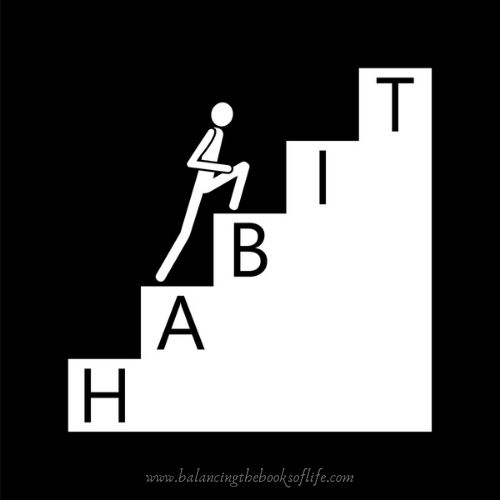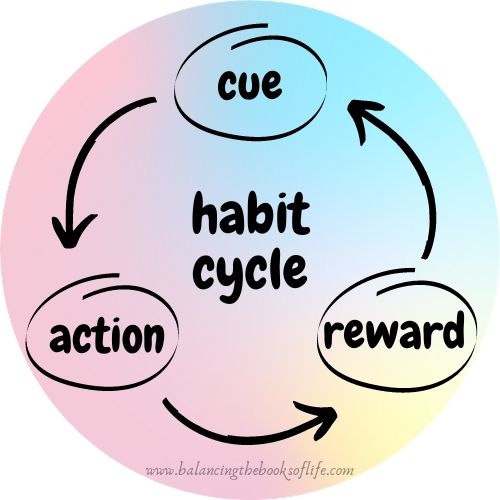“We are what we repeatedly do. Excellence, then, is not an act, but a habit.”
Will Durant

Habits is a word we hear often. Understanding what are habits, how are habits formed, and how do they best serve us, isn’t always clear though.
Despite my tendency to geek out when it comes to habits, I personally still struggle with them. In the past, I’ve tried to develop habits, only to feel unsuccessful. I have struggled to stick with my habit building goals. In trying to keep up with the consistency, I get frustrated, and usually bottom out. It leaves me feeling like a failure, and asking myself what’s the point. Then sometime later, I pick myself up, try again, and repeat the cycle.
Am I alone? No? I didn’t think so.
Doing anything with the consistency that is needed to develop good habits requires will power. I know, for myself, my will power just doesn’t feel that strong most of the time. But just because it doesn’t feel that strong, doesn’t mean it isn’t.
Will power acts just like any other muscle in our body. With a lot of use, it can fatigue and let us down, but then it will grow stronger to be able to handle more the next time it is needed. With the right strategy, we can use enough, but not too much. This enables us to build our will power in such a way that habit formation can be successful.
What are habits anyways?
Let’s define what exactly are habits. This will enable us to see how to best break it down into pieces that are manageable for our brains and our willpower muscle. A habit is a routine or action that we do repeatedly, using the prefrontal cortex of our brain, and happens in our subconscious. In other words, it is something that we do, repeatedly, without having to think about it.
Habits can best be described as a cycle. Some will also call it a circle, or a triangle. I first learned about the habit cycle from Charles Duhigg, in his book The Power of Habit.

It starts with a trigger, or a cue. Something that signals the brain to start the habit cycle.
As soon as we experience the trigger, our brain signals what essentially acts as a switch, and tells our body to carry out an action or routine. This is, at its core, the habit.
Once the action is complete, we experience a release of dopamine, which chemically relates to how we experience pleasure. As a result, the completion of the action is pleasurable and our brain receives a reward.
Because we as humans like experiencing pleasurable things, this reward is noted as positive. Our brain looks to repeat this habit cycle, in attempt to experience another dopamine release.
Here’s the ticket: it happens in our subconscious. It is automatic. We often don’t even recognize we are doing it, and we definitely aren’t making a conscious decision about it.
This can be a good thing, if the habit is a “good” habit. I’ll go into good habits in a bit, but really what it means is it’s a habit you like. If it’s a habit you don’t like, it can be a cause of some serious frustration (late night snacking anyone?).
In simple terms, what this results in is that habits are really freaking hard to change. We are, quite literally, trying to re-wire our brains when we attempt to change and develop habits.
How long does it take to make, change and develop habits?
The traditional advice of building a habit in 21 days is no longer considered accurate. While for some people, and for some habits, this is certainly true, on average, it takes 66 days to build a habit. 66 days of taking the same action, consistently, in a row. Realistically, it could take longer.
So, you’re reading this, wondering how you are ever going to stick with something for 66 days when you traditionally quit before the first 2 weeks is up. I hear ya. I’ve been there, far too many times to count.
However, it can take as little as 21 days for the habit to start to take hold. So, the 21 days isn’t all gone. But to solidify that habit in the prefrontal cortex, you are going to have to average doing the habit for on average 66 days, but potentially shorter, or potentially longer.
There are 6 steps you need to take to maximize your chances of successful habit formation, which I go into in this article. To get started, though, create a change so small that it is almost impossible to not do. This will absolutely be necessary to help get past that first 21 days. As it gets easier, you can build on it.
Related Reading:
- The Role Habits Play in Reaching Your Goals
- 5 Secrets to Keeping A Clean House
- 6 Types of Self Care to Reduce Stress
- Increase Productivity Working From Home
Good habits vs bad habits
Now, about this idea of good habits vs bad habits. I’m going to put it out there right now that everything is about perspective. Without going into the specifics of thought work, the only fact behind a habit is the action in which you are taking that is the habit itself. Anything else regarding the habit is merely thoughts surrounding the habit, and entirely optional.
What I’m saying is this: a habit is only “good” or “bad” if you perceive it to be, which you get to decide.
Say, what? Bear with me.
Your thoughts about if a habit is a good habit or a bad habit is just that, a thought. Contrary to popular belief, you have complete control over your thoughts, and can construct your feelings around any current habits however you want. If you like a habit, there is not reason to change it. If you don’t like a habit, then go ahead and try to modify it. Neither is good or bad, it just is.
For instance, some people check the news first thing in the morning when they get to work. They have a cup of coffee, check their email, and read the news. This is part of a daily routine they have and helps them get settled into work. This is a habit. They enjoy it and it really works for them. Personally, the news usually diminishes my mood and distracts me, making it harder for me to then switch and focus on work. I would not do well with that habit, and indeed is not one I have.

Here are a few examples that are usually perceived to improve our well-being:
- Brushing your teeth
- Going to bed at a consistent time and waking up at a consistent time
- Turning lights off when you leave a room
- Picking things up and putting them away when you are done with them
- Washing your hands after using the restrooms
- Turning your phone off at night
Here are a few examples that can distract or deter us from our goals:
- Responding to email immediately during our work day instead of having dedicated times to check email
- Having an inconsistent bedtime and/or not getting enough sleep
- Looking at social media on your phone before you roll out of bed
- Emotional eating
- Late night snacking
- Binge watching TV
These are just some general ideas, and notice I avoided calling them good or bad. They can be whichever you need them to be. If you have a habit that is working for you even though it might be socially perceived as “bad” I challenge you to allow yourself to be content with the fact that it works for you and is a perfectly fine habit to have.
One more thing about habit formation…
Well, two. There are 2 key things here that I need to point out about how to develop habits:
- Building brand new habits is harder than changing existing habits.
- Almost everything you do is a habit.
Read those sentences again. Because they are incredibly important.
“Change might not be fast, and it isn’t always easy. But with time and effort, almost any habit can be reshaped.”
Charles Duhigg, The Power of Habit
When we try to build NEW habits, we have to start from square one. We don’t have a trigger, we don’t have a routine, and we don’t have a reward. Everything within the habit cycle is brand new to our brains. And because it’s brand new, it takes a lot of thought and it takes a lot of effort.
Our brains LOVE habits. They run on autopilot. That is the point. Our brain can put them into gear and we don’t even know it.
But something brand new; however, requires focus. It is not running on autopilot, so it takes consistent decision making, and dedicated action. Which your brain doesn’t want to do.
If we just try to change a habit, we have a different story. The trigger, action and reward already exist. We just need to slightly modify the cycle. Suddenly, it’s not as much work, it doesn’t take quite as much effort. As a result, it doesn’t require as much willpower.
Habits are comprised of a trigger, action and reward. They are built on the reliance of a dopamine response, and that chemical reactive response is crucial to make a habit stick. Check out next week’s article for the 6 steps to develop good habits, for whatever that means for you, working under the umbrella of trying to modify an existing habit, instead of creating a new one from scratch.


Michele is the fun-loving, easy going, project managing, financial savvy author behind the Balancing the Books of Life blog. She invites other moms to come along her journey to both become financially independent and spend time on things they love!


Leave a Reply